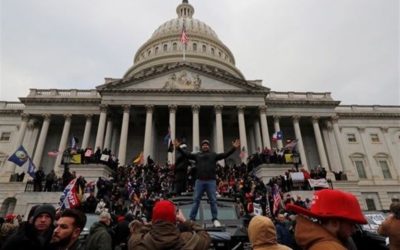|
New article in the International Marxist-Humanist commenting on the Trump coup attempt. |
|
|
This Was No Joke—Trump’s Attempted Coup Against Democracy on January 6
Genuine Marxists, such as Marxist-Humanists, have always been staunch defenders of liberal democracy against rightwing efforts to eviscerate or eliminate it
January 7, 2021 Length:1670 words
Summary: The foiled attack on the Capitol by neo-fascist white nationalists on January 6 marks a potential turning point in combatting the reactionary currents of which Trump is but the mouthpiece and expression – Editors
The storming of the U.S. Capitol on January 6, just as Congress was meeting to acknowledge the results of the 2020 election, was clearly directly provoked by Trump—but not only Trump. And not only by Rudy Giuliani, who exhorted the fascist mob as it was about to start its march from near the White House, “let’s have trial by combat.” It was inspired and fostered by all Republicans who parroted Trump’s nonsense about a “stolen election” and those—whether in power or out of it—who echoed, endorsed, or remained mute about Trump’s persistent efforts since the day he took office to destroy liberal democracy (which is not to be equated with “liberals”) and move the U.S. toward single-party authoritarian rule.
Let’s be clear: this was a fascist, white nationalist, racist mob that descended upon and broke into the Capitol—the first time this has ever happened in U.S. history. In many respects, it represented the “Unite the Right” rally of Charlottesville, Virginia in August 2017 brought home to Washington DC. That in itself is a severe indictment of the Republicans who are now scurrying to distance themselves from Trump, given that they had years to at least pretend that they opposed the racist far-Right—and yet virtually none of them did so. And let’s not forget that virtually all Republicans propagandize about nonexistent voter fraud, which January 6 was an outgrowth of. Accommodating Trump and/or his agenda was more important to them than pushing back against the vile threat that they pose to democracy and innumerable people’s lives.
Even now this tendency to prevaricate and avoid confronting the real issue is seen in the mainstream media’s almost universal refusal to name the mob that broke into the Capitol as “fascist” or “neo-fascist.” Instead, many Democrats as well as Republicans are claiming that “anarchists” were behind the mayhem. It’s to be expected that those who promote the fantasy that Biden stole of the election would also spread this even more ludicrous claim. But that certainly doesn’t explain why liberals in the media tail–end them by saying the rioters were anarchists—as if anarchists wave Confederate flags and salute Trump! They go out of their way to avoid naming the culprit as fascism because they do not want to admit that fascism is not some exceptional case but the expression of the system they adhere to when it plunges into a steep decline.
Clearly, the effort to disrupt the Senate’s confirmation of Biden as President was the logical and actual outcome of five years of capitulation to Trump by a large swath of the ruling class (and virtually all Republicans) and tens of millions of “ordinary” Americans. To be sure, neo-fascist white nationalist currents have long been part of U.S. society, but Trump enabled them to come to the surface and become acceptable to wide portions of the populace. It will go down as his singular contribution to history. What he reaped for five years (and much longer, going all the way back to his days as a New York real estate magnate) was sown on January 6.
But that is only part of the picture. The more complete picture is that January 6 stands as an indictment of how the entirely of U.S. society is structured along dehumanized racial lines. No one, not even Biden, could avoid noticing the vast difference between the kid-gloves approach against the mob storming the Senate chambers and the brutal police assaults against protesters—Black, Latinx, Asian, and white—in the rallies and marches for racial justice and for Black lives following the police murder of George Floyd on May 25. Truly stunning was how easy it was for the protesters to enter the Senate chamber—in stark contrast to the innumerable protests held by leftists for decades in DC where the massive deployment of police and/or the military made it impossible to get close to such centers of power. Not only was the initial police presence extraordinarily thin, some cops removed barriers to the Capitol grounds, allowing rightists to enter the building. In the end, no more than a few dozen were arrested; the bulk of the crowd was cordially escorted off the grounds once a curfew took effect.
The DC and Capitol Police certainly cannot complain of lack of experience in handling protests—they have corralled and brutalized protesters at events many times larger than the one on January 6. Nor can the city’s administration claim that the violence was totally unexpected: Trump supporters for weeks had been promising on social media a riot in DC if Trump was denied his reversal of the election. There is no way that the DC authorities could have been caught so short-handed and “unprepared” unless a decision was made beforehand to let the mob have as much leeway as possible—since as strong defenders of the police, Trump and his supporters are viewed by the authorities in a sympathetic light. And this in a city with a Black Mayor and Police Commissioner—something that comes as no surprise to those living in cities like Chicago.
Kofi Ademola, a Chicago activist who helped organize some of the protests during the summer, said of the police response in DC: “It’s not any shock that we see this huge contradiction that they can storm a Capitol, break into elected officials’ offices, the chamber, and create other chaos trying to perform a fascist coup, and we see little to no consequences. But Black protesters here in D.C. and Chicago, we’re heavily policed, brutalized, for literally saying, ‘Don’t kill us.’ There were no planned insurrections. We were literally just advocating for our lives. It speaks volumes about the values of this country. It doesn’t care about our lives.”
The fact that the attack fizzled by the time the national guard belatedly appeared on the scene should fool no one that this was the mere act of “clowns” who spent their time in the Capitol taking selfies and stealing souvenirs. Mike Davis’s comment that the “‘sacrileges’ in our temple of democracy…constituted an ‘insurrection’ only in the sense of dark comedy; [it] was essentially a big biker gang dressed as circus performers” completely misses the mark. Hitler’s Beer Hall Putsch of 1923, which crumbled as soon as shots were fired, was also ridiculed at the time as an act of “clowns.” A decade later no one was laughing.
Truth be told, Trump has far more support even after January 6 than Hitler could have dreamed of having in the early 1920s. But now that the ramifications of genuflecting before him for years have blown up in their faces, even Mike Pence and Mitch McConnell have broken with Trump—as if these sordid facilitators aren’t responsible for the chaos on January 6. It is one thing to encourage racist mobs to attack Black Lives Matter protestors, quite another when the same forces suddenly show up trying to kick the doors down to your office. How interesting to see how fast such epigones find religion when the violent forces they have fostered finally come home to roost.
There is no question that Trump—living as always in a mental universe of his own—overplayed his hand, which has forced many of his closest allies to abandon him, like rats off a sinking ship. That there is even discussion of removing him from office by invoking the 25th Amendment to the Constitution is remarkable, given that he obtained 74 million votes only two months ago. He may be dead for now, politically—even if he tries to somewhat clean up his act between now and the time he leaves (or is forced to leave) office. But that’s not the crucial point, because Trump was never the real issue—despite the proclivity of many to act as if the central problem was his distorted personality. He was from the start a mouthpiece for forces that he neither created nor which depend upon him for their existence. These have been living in the bowels of society for some time, and a confluence of objective and subjective factors have brought them to the surface not just in the U.S. but on a global level.
The decadence of U.S. capitalist society will not be cleansed away come January 20. There are plenty of his former enablers and/or supporters who will be more than willing to pick up and advance his reactionary agenda—only this time with more intelligence and sophistication. And they will have a mass base of tens of millions to build from. We can bet that this sugar-coated Trumpism without Trump that suddenly has fallen in love with “peace,” “non-violence,” and “mutual dialog” will at the first opportunity aim their barbs against “violent provocateurs” by going after those on the Left protesting police killings, prison warehousing, and capitalism.
A tremendous opening for the forward movement of the freedom struggles is nevertheless before us. First, the run-off election in Georgia, in which both pro-Trump candidates were defeated, portends a different future, in which Blacks, other people of color, immigrants, women, the working class, progressive whites, LGBTQ people, and environmentalists can self-mobilize in the face of huge obstacles. Second, that the events of January 6 have produced a deep rift in the pro-Trump circles and the ruling class in general is a positive and welcome development.
The fact that bourgeois democracy remains alive, despite four years of Trump, is a vital accomplishment. Genuine Marxists, such as Marxist-Humanists, have always been staunch defenders of liberal democracy against rightwing efforts to eviscerate or eliminate it—at the same time as advancing a radical anti-capitalist, anti-racist, and anti-sexist perspective that far surpasses it. Let us continue to do so with open eyes and sober senses, and most of all, with a dedication to continuing and deepening the magnificent freedom struggles of the past year that have succeeded in placing American “civilization” on trial.
ABOUT THE AUTHOR
Peter Hudis has written widely on Marxist theory and contemporary politics and is the author of Marx's Concept of the Alternative to Capitalism, and Frantz Fanon: Philosopher on the Barricades. He is General Editor of The Complete Works of Rosa Luxemburg (three volumes have appeared so far).
















